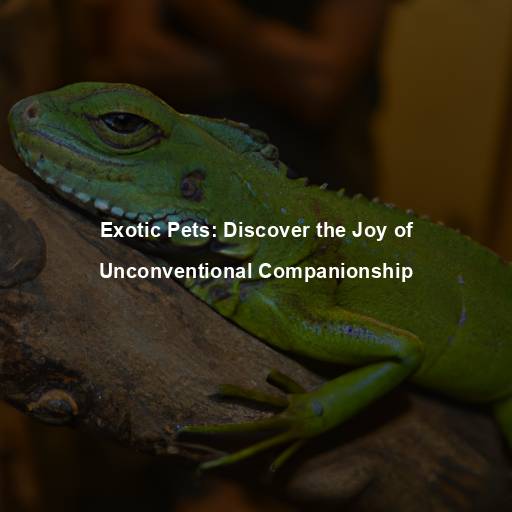Are Capybaras Exotic Pets?
Last Updated on November 2, 2023 by Evan
Contents [hide]
- 1 Understanding Capybaras: The World’s Largest Rodents
- 1.1 The Appeal of Capybaras as Pets
- 1.2 The Complexities of Capybara Care
- 1.3 The Challenges of Capybara Ownership
- 1.4 Ethical Considerations
- 1.5 Exploring Alternative Interactions with Capybaras
- 1.6 Understanding Capybara Behavior
- 1.7 Capybara Habitat Requirements
- 1.8 The Importance of Socialization
- 1.9 Capybara-Proofing Your Home
- 1.10 Capybaras and Children: A Cautionary Note
- 1.11 Responsible Capybara Ownership
- 1.12 Appreciating Capybaras in Alternative Settings
- 2 FAQs – Are Capybaras Exotic Pets?
- 2.1 What is a capybara?
- 2.2 Are capybaras legal to have as pets?
- 2.3 Can capybaras be kept as pets?
- 2.4 What considerations should I keep in mind before getting a capybara as a pet?
- 2.5 Can capybaras live indoors?
- 2.6 How social are capybaras?
- 2.7 What are the potential challenges of owning a capybara as a pet?
- 2.8 Are capybaras suitable pets for everyone?
Understanding Capybaras: The World’s Largest Rodents
Capybaras, known for their friendly and docile nature, have gained popularity in recent years as potential pets. Native to South America, these semi-aquatic creatures are the world’s largest rodents, closely related to guinea pigs and porcupines. With their unique appearance and amiable demeanor, capybaras have captivated the hearts of many animal enthusiasts. However, the question remains: are capybaras suitable as exotic pets?
The Appeal of Capybaras as Pets
Capybaras possess a charm that is hard to resist. Their large size and endearing features make them undeniably adorable. They are known for their social nature and often form strong bonds with their human caregivers. Capybaras are highly intelligent creatures and can be trained to perform various tasks.
The Complexities of Capybara Care
Pondering the prospect of welcoming a capybara into your humble abode? Hold on to your thoughts, for the maintenance of these exotic creatures is far from a whimsical affair. Venturing into the realm of capybara companionship demands a deep comprehension of their intricate care regimen. Unveiling the enigmatic world of capybaras, here are essential aspects to weigh before taking the plunge:
a. Space and Enclosure
Capybaras thrive in spacious environments that mimic their natural habitat. These semi-aquatic creatures require access to water, such as a pond or pool, as they love to swim and soak. Additionally, they need ample space to roam and graze. A small backyard or apartment is not suitable for housing a capybara.
b. Diet and Nutrition
Capybaras are herbivores with specific dietary needs. Their diet primarily consists of grasses, aquatic plants, and a variety of vegetables. Maintaining a balanced and nutritious diet is vital for their overall health. It is essential to consult with a veterinarian or a capybara expert to ensure you are providing the correct diet for your pet capybara.
c. Socialization and Companionship
Capybaras, those charismatic creatures with their endearing nature, find solace in the companionship of their kin. It is said, and quite convincingly so, that raising a lone capybara as a pet may sow the seeds of loneliness and instigate puzzling behavioral patterns. The ideal scenario for these highly social beings is to be kept in pairs or small groups, creating a tapestry of camaraderie and interconnection. Nevertheless, let us not forget the importance of proper introductions and a vigilant eye to ensure the harmonious coexistence of these marvelously enigmatic creatures.
d. Legal Considerations
Before bringing a capybara into your home, it is crucial to research the legalities surrounding their ownership. Capybaras are considered exotic pets in many regions, and owning them may require permits or licenses. It is essential to comply with local laws and regulations to avoid legal complications.
The Challenges of Capybara Ownership
Owning a capybara comes with its fair share of challenges. It is crucial to be aware of these difficulties before making a decision. Here are some aspects to consider:
a. Specialized Veterinarian Care
Caring for capybaras presents a captivating challenge as their veterinary requirements go beyond the norm. Sourcing an adept veterinarian well-versed in the art of treating these remarkable creatures can prove to be a perplexing pursuit, particularly in regions where they dwell outside the realms of conventional pets. Ensuring their optimal vitality necessitates a parade of periodic check-ups, inoculations, and preemptive measures, lest their welfare be jeopardized.
b. Cost and Maintenance
When it comes to capybaras, the investment required can be quite staggering. From building a suitable habitat to catering to their specific dietary needs and healthcare requirements, the costs can swiftly spiral. Furthermore, maintaining a clean and hygienic living environment is paramount to safeguard their well-being and prevent any potential health complications. The financial commitment that accompanies capybara care is undeniably significant, leaving owners with plenty to ponder.
c. Lifespan and Long-term Commitment
Capybaras have a relatively long lifespan, ranging from 8 to 12 years in captivity. Taking on the responsibility of caring for a capybara means committing to their well-being for a significant portion of your life. It is essential to consider the long-term commitment required before bringing one into your home.
Ethical Considerations
Contemplating the ethics of domesticating capybaras sends ripples of perplexity throughout the passionate animal welfare realm. Engulfed in a raging debate, one side ardently supports the notion that these enigmatic creatures, belonging to the wild, ought to revel undisturbed in the confines of their natural terrain. Pet aficionados warn that embracing these capybaras could inadvertently fuel the illicit wildlife market and potentially wreak havoc upon their seamless existence. Carefully dissecting the moral quandaries at hand becomes instrumental in shaping a verdict cognizant of the animals’ holistic welfare.
Exploring Alternative Interactions with Capybaras
For those who may find themselves pondering the feasibility or ethical quandaries of having a capybara as a domestic companion, fear not! There exist alternative avenues through which one can marvel at the wonders of these enigmatic creatures. Numerous wildlife sanctuaries and rescue organizations have extended their generous embrace to enable curious minds to partake in supervised encounters with capybaras. In doing so, one not only gains a newfound appreciation for these majestic beings but also contributes to the noble cause of conservation and the promotion of ethical treatment towards animals.
Understanding Capybara Behavior
Capybaras, those captivating creatures known for their social prowess, possess an innate ability to weave intricate bonds within their animal tribes. Existing in a realm of gentle amiability, these majestic mammals forge remarkable connections, even extending their affection to human counterparts. Observing their endearing behavior of grooming and cuddling, one cannot help but be captivated by their undeniable allure. However, it is essential to remember that their affability arises from a deep-rooted kinship, emphasizing the importance of maintaining their social connections among their own kind.
Capybara Habitat Requirements
Capybaras are semi-aquatic creatures, native to the wetlands of South America. As such, they require access to water for swimming, cooling down, and maintaining good hygiene. A suitable capybara enclosure should include a large pool or pond, allowing them to engage in their favorite aquatic activities. Additionally, capybaras require ample space for grazing and exploring, as they are herbivores that rely on a varied diet of grasses and vegetation.
The Importance of Socialization
Capybaras, those fascinating creatures of nature, find solace in the presence of their fellow capybaras. In their natural habitat, they band together forming tight-knit communities, offering emotional support and friendship. When these lovable animals become pets, it becomes imperative to create avenues for them to mingle with their own kind. If owning a gaggle of capybaras proves challenging, organizing social get-togethers or exploring capybara-friendly locales can go a long way in satisfying their inherent need for socialization.
Capybara-Proofing Your Home
Capybaras are curious and agile creatures, capable of exploring their surroundings with ease. Before bringing a capybara into your home, it is essential to capybara-proof the environment to ensure their safety and prevent any damage. Some necessary precautions include:
a. Secure Fencing
Capybaras are excellent swimmers and jumpers. A sturdy and secure fence is crucial to prevent escape and protect them from potential dangers outside their enclosure. The fence should be tall enough and have no gaps that could allow them to squeeze or climb through.
b. Toxic Plant Removal
Capybaras may nibble on plants within their reach. It is vital to remove any toxic plants from their environment to prevent accidental ingestion and poisoning. Consult with a veterinarian or capybara expert to identify safe vegetation options for their enclosure.
c. Electrical Cord Management
If you thought your furry friend’s chewing habits were limited to shoes and furniture, think again! Capybaras, those adorable rodents with a taste for adventure, also love sinking their teeth into electrical cords. To avoid any shocking mishaps and keep your capybara and your home safe, be sure to keep cords well out of their reach. Consider using cord covers or even deterrent sprays to dissuade these little chewers from getting their jaws on any potential electrical hazards.
Capybaras and Children: A Cautionary Note
Considering capybaras as pets can be a perplexing decision, especially for families with young children. Although these creatures are known for their amiable nature, their size and power can lead to unintentional harm. Thus, it’s crucial to exercise caution, closely supervise interactions, and educate children on appropriate ways to interact with capybaras to ensure the safety of both parties involved.
Responsible Capybara Ownership
When it comes to capybaras, the magnitude of responsibility cannot be underestimated. These delightful creatures require a dedicated owner who is willing to invest time, effort, and resources into their care. From space requirements to socialization needs, responsible capybara ownership demands a thorough understanding of their unique characteristics and the commitment to meet their specific needs.
a. Research and Education
Before taking the plunge and deciding to bring home a capybara as a pet, it is crucial to dive deep into extensive research. Embracing the mystique of their behavior, unraveling the enigmatic layers of their dietary needs, and scrutinizing their intricate habitat requirements are all pivotal steps to guarantee a harmonious coexistence. By delving into the profound complexities surrounding capybara care, you can responsibly ensure a nurturing and conducive environment for their ultimate well-being.
b. Consult with Experts
When it comes to taking care of capybaras, don’t just rely on Google searches and online forums. Instead, reach out to veterinarians or capybara experts who have hands-on experience with these fascinating creatures. By tapping into their expertise and gaining insights tailored to capybara care, you’ll be well-prepared to meet the peculiar demands of these adorable, yet perplexing, animals.
c. Legal Compliance
If you’ve set your sights on adding a capybara to your furry family, it’s imperative to embark on a thorough exploration of the local legal labyrinth. Take the plunge into the bewildering world of laws and regulations governing capybara ownership. Arm yourself with the knowledge and necessary permits to navigate through the enigmatic paperwork and secure your lawful right to proudly boast a capybara as your beloved pet companion.
d. Commitment to Long-term Care
Capybaras have relatively long lifespans, and their care requires a long-term commitment. Consider the implications of caring for a capybara for up to 12 years or more and ensure that you are ready for the responsibility.
Appreciating Capybaras in Alternative Settings
Discovering alternative ways to appreciate and indulge in the marvelous presence of capybaras becomes essential, especially when owning one isn’t within the realm of possibility or aligning with your current circumstances. Luckily, there exist myriad avenues to explore and savor the charm of these fascinating creatures, ensuring that their essence remains alive and vibrant in your world. Embrace the allure of capybaras through virtual encounters, captivating documentaries, engaging social media accounts, or even by visiting wildlife sanctuaries that harbor these majestic beings. Let your curiosity lead you into uncharted territories, where the world of capybaras waits to unravel its mesmerizing tapestry of wonder and enchantment.
a. Wildlife Sanctuaries
Visit wildlife sanctuaries or rescue organizations that provide opportunities to observe and interact with capybaras in a controlled and educational environment. These organizations often prioritize the well-being and welfare of the animals in their care.
b. Volunteer and Support Conservation Efforts
Explore the captivating world of capybaras and join in the noble cause of preserving their precious habitats by either participating as a volunteer or by extending your support to esteemed organizations committed to their conservation. Embark on an enlightening journey where you not only assist in bolstering capybara populations but also gain profound insights into the astonishing lives of these extraordinary creatures. Experience the sheer joy of contributing to a cause that ensures the survival and protection of these fascinating beings through your invaluable efforts and dedications. Unleash your compassion and embark on a purposeful adventure that promises to leave an indelible mark on capybaras’ future existence.
FAQs – Are Capybaras Exotic Pets?
What is a capybara?
Step into the mesmerizing world of the capybara – the king of rodents – as we unravel its colossal presence on this planet. Hailing from the enchanting landscapes of South America, this enigmatic creature proudly embraces its semi-aquatic existence, gracefully dwelling alongside the flowing ribbons of rivers, tranquil lakes, and mystical marshlands. Prepare to be bewitched by its amiable demeanor and captivating visage, for capybaras have effortlessly soared to fame, captivating hearts worldwide with their irresistible charm.
Are capybaras legal to have as pets?
When it comes to capybara ownership, the law can be a perplexing maze of regulations and requirements. Different countries, states, and even local jurisdictions have their own set of rules, leaving potential capybara enthusiasts feeling both excited and bewildered. Before embarking on your capybara journey, it is vital to navigate this legal labyrinth by reaching out to the right authorities, such as animal control or local governing bodies, to ensure you’re on the right side of the law.
Can capybaras be kept as pets?
Keeping capybaras as pets may seem like an intriguing idea, but before embarking on this unique journey, it is essential to grasp the intricacies involved. These delightful creatures necessitate specialized care and a well-suited habitat to truly flourish. It is crucial to comprehend that their needs transcend the ordinary, presenting a considerable challenge, particularly within the confines of a domestic environment. To provide capybaras with a fulfilling existence, one must allocate ample space, ensure access to water, carefully curate their dietary requirements, and facilitate social interactions either with their human counterparts or fellow capybaras. The road to capybara companionship may be perplexing, but with dedication and understanding, it can be an extraordinary adventure.
What considerations should I keep in mind before getting a capybara as a pet?
Thinking about getting a capybara as your new best friend? Pause for a moment and consider a few things. First things first, do you have the space to accommodate the vivacious habitat they require? These fuzzy fellows need lots of room to roam. Don’t forget about the swimming component – capybaras simply love their water, so make sure you can provide a sizable pool for their aquatic adventures. Now, let’s talk food! Fresh grass and veggies are their jam, so be prepared to stock up on the greens. Veterinary care is also crucial – find a specialized exotics vet who can cater to their unique needs. Lastly, remember that capybaras are social butterflies, so they need companionship. Be it from their human friend or another capybara buddy, they crave that connection. So, if you can check all these boxes, get ready to embark on a wild and wonderful capybara companion journey!
Can capybaras live indoors?
While capybaras can be kept indoors temporarily, providing them with an adequate outdoor habitat is highly recommended. Due to their large size and natural behavior, it can be very challenging to create a suitable indoor environment that meets their needs for space, water, and socialization. It is crucial to ensure capybaras have access to a well-designed outdoor enclosure to fulfill their natural instincts.
Capybaras, these intriguing creatures, embrace the power of social connection as they gracefully navigate through the wild. In the heart of Mother Nature, they gracefully glide through the mesmerizing symphony of social bonds, finding solace in the company of their fellow capybara comrades. As captivated pets, capybaras yearn for the touch of human caregivers or the rhythmic dance of fellow capybara friends in order to tread the path of contentment and fulfillment. Take heed, dear readers, for capybaras are not designed for solitary existence, and the absence of proper socialization may unveil a tapestry of stress and perplexing behavioral patterns.
What are the potential challenges of owning a capybara as a pet?
Owning a capybara as a pet comes with various challenges. Their large size requires extensive space, both indoors and outdoors. As semi-aquatic creatures, they need access to water to swim and cool off. Their diet can also be quite demanding, as capybaras feed primarily on grass and vegetation. Additionally, finding a qualified veterinarian with experience in treating exotic animals might be more challenging compared to traditional pets. Moreover, the complexity of capybara care and their social needs should not be underestimated.
Are capybaras suitable pets for everyone?
Owning a capybara is like embarking on a wild adventure – one that demands your utmost devotion, both in terms of time and finances. These fluffy creatures, although irresistibly adorable, require a level of expertise and responsibility that only experienced owners can truly comprehend. Before plunging into the capybara world, dive deep into research, enlighten yourself about every nook and cranny of capybara life, and ensure that you are well-prepared for the unpredictable challenges that come hand in hand with these extraordinary pets.







